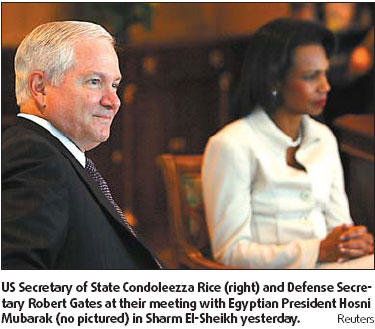US Secretary of State Condoleezza Rice and Defense Secretary Robert Gates joined forces in the Middle East Tuesday to push Arab allies to do more to stabilize Iraq and counter the rise of Iran.
The top Bush administration officials, on a rare joint visit, met Arab ministers in Egypt with promises of tens of billions of dollars in US weapons and military aid they said would help counter Al-Qaida, Hezbollah, Syria and Iran.
In another move that could please Washington's Arab friends, the United States signed a statement endorsing an Arab initiative for peace between Israel and the Palestinians.
But in public they gave no significant new details of the US proposal for a conference or meeting on Middle East peace later this year - the main concern of the Arabs.
Rice and Gates, who later left for Saudi Arabia, appealed to Arab countries to do more to encourage reconciliation in Iraq.
"All parties need to really now throw their weight behind this effort for national reconciliation," said Rice at a news conference with Egyptian Foreign Minister Ahmed Aboul Gheit.
"It means an intensification of the efforts of those who have influence (in Iraq)."
The United States has repeatedly sought Arab help with Iraq although its Arab allies have little or no say there.
Saudi Arabia has some weight with Sunni Arab tribal leaders and Washington also wants Riyadh to tighten its border to stop Saudi militants loyal to Al-Qaida going to fight in Iraq and staging suicide attacks against Iraqi Shi'ites and US forces.
Before leaving for the Middle East, Rice announced military aid to Egypt of US$13 billion over 10 years, the same level as for at least the last six years. But Washington is offering Israel an increase of about 25 percent - to US$30 billion over 10 years.
Defense officials said Saudi Arabia and other Gulf states would get at least US$20 billion in arms sales and other help over the next decade but final figures have not been agreed yet.
Rice strongly denied that US weapons were being offered as a means of getting more help in Iraq, where the United States is battling Shi'ite militia and Sunni insurgents.
"This is not an issue of quid pro quo. We are working with these states to fight back extremism," Rice said.
Iran has criticized the promised arms sales, accusing the United States of trying to destabilize the region.
"If there is a destabilization of the region it can be laid at the feet of an Iranian regime," said Rice.
Gates told a round table with Washington-based reporters that both the Egyptian government and some Washington politicians were worried about the consequences for any precipitous US withdrawal from Iraq.
"There is, I think, a growing body of opinion in Washington - wherever you are on the issue of withdrawal - that whatever we do next in Iraq needs to be done very carefully and with a view to the long-term stability of the region," he said.
At the talks in Sharm el-Sheikh, the United States signed a joint statement with Egypt, Jordan and six Gulf governments, endorsing the Arab peace initiative of 2002 as one of the foundations for Middle East peace.
The initiative offers Israel normal relations with all Arab countries in return for full withdrawal from the land which Israel captured in 1967. Israel at first rejected the plan, but has said recently it could be a basis for negotiation.
Meanwhile, Iranian Foreign Minister Manouchehr Mottaki said in a statement that the US plan to "sell billions of dollars worth of arms and prepare illusive scenarios in the region" is an instance of adventurism, the official IRNA news agency reported.
"The United States knows quite well that the Middle East has suffered a lot from Washington's one-sided and unfair support for the Zionist regime and for its war mongering and expansionist policies," Mottaki said.
He pointed out that Washington has ulterior motives for the arms trade, which are to save the US arms manufacturing companies from bankruptcy," adding "White House rulers" want to use their influence at the end of their tenure to garner benefits for arms companies.
(China Daily via agencies August 1, 2007)


